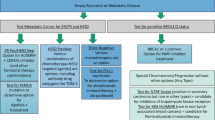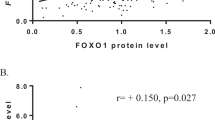Abstract
Expression of both P-glycoprotein (P-gp) and mutant p53 have recently been reported to be associated with poor prognosis of breast cancer. The expression of P-gp is associated in vitro and in vivo with cross-resistance to several anti-cancer drugs. p53 plays a regulatory role in apoptosis, and mutant p53 has been suggested to be involved in drug resistance. Interestingly, in vitro experiments have shown that mutant p53 can activate the promoter of the MDR1 gene, which encodes P-gp. We investigated whether p53 and P-gp are simultaneously expressed in primary breast cancer cells and analysed the impact of the co-expression on patients prognosis. Immunohistochemistry was used to investigate P-gp expression (JSB-1, C219) and nuclear p53 accumulation (DO-7) in 20 operable chemotherapy untreated and 30 locally advanced breast cancers undergoing neoadjuvant chemotherapy with doxorubicin and cyclophosphamide. Double immunostaining showed that P-gp expression and nuclear p53 accumulation often occur concomitantly in the same tumour cells. A correlation between p53 and P-gp expression was found in all 50 breast cancers (P = 0.003; Fisher's exact test). P-gp expression, nuclear p53 accumulation, and co-expression of p53 and P-gp were more frequently observed in locally advanced breast cancers than in operable breast cancers (P = 0.0004, P = 0.048; P = 0.002 respectively. Fisher's exact test). Co-expression of p53 and P-gp was the strongest prognostic factor for shorter survival by multivariate analysis (P = 0.004) in the group of locally advanced breast cancers (univariate analysis: P = 0.0007). Only 3 out of 13 samples sequentially taken before and after chemotherapy displayed a change in P-gp or p53 staining. In conclusion, nuclear p53 accumulation is often associated with P-gp expression in primary breast cancer, and simultaneous expression of p53 and P-gp is associated with shorter survival in locally advanced breast cancer patients. Co-expression of P-gp and mutant p53 belong to a series of molecular events resulting in a more aggressive phenotype, drug resistance and poor prognosis.
This is a preview of subscription content, access via your institution
Access options
Subscribe to this journal
Receive 24 print issues and online access
$259.00 per year
only $10.79 per issue
Buy this article
- Purchase on Springer Link
- Instant access to full article PDF
Prices may be subject to local taxes which are calculated during checkout
Similar content being viewed by others
Author information
Authors and Affiliations
Rights and permissions
About this article
Cite this article
Linn, S., Honkoop, A., Hoekman, K. et al. p53 and P-glycoprotein are often co-expressed and are associated with poor prognosis in breast cancer. Br J Cancer 74, 63–68 (1996). https://doi.org/10.1038/bjc.1996.316
Issue Date:
DOI: https://doi.org/10.1038/bjc.1996.316
This article is cited by
-
Mutant p53 promotes RCP-dependent chemoresistance coinciding with increased delivery of P-glycoprotein to the plasma membrane
Cell Death & Disease (2021)
-
Targeted production of reactive oxygen species in mitochondria to overcome cancer drug resistance
Nature Communications (2018)
-
Persistent expression and function of P-glycoprotein on peripheral blood lymphocytes identifies corticosteroid resistance in patients with systemic lupus erythematosus
Clinical Rheumatology (2016)
-
E-cadherin increasing multidrug resistance protein 1 via hypoxia-inducible factor-1α contributes to multicellular resistance in colorectal cancer
Tumor Biology (2016)
-
p53 overexpression increases chemosensitivity in multidrug-resistant osteosarcoma cell lines
Cancer Chemotherapy and Pharmacology (2016)



